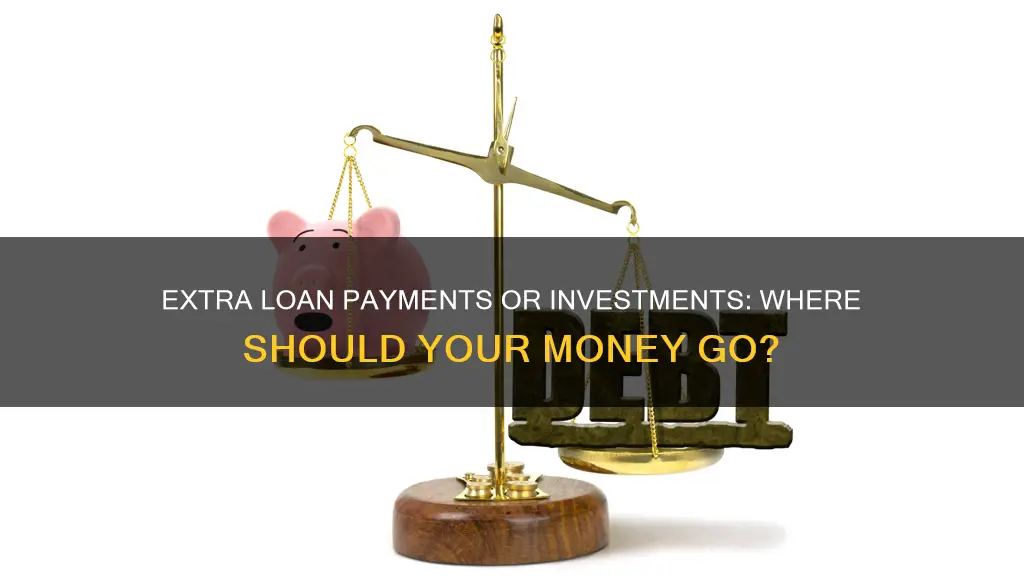
Whether to pay off a loan or invest depends on a variety of factors, including your financial situation, the interest rate on your loan, and your risk tolerance. Paying off a loan early can save you money on interest and give you peace of mind, but investing can provide higher returns and help you build wealth. It's important to consider your goals and priorities when deciding which option is best for you.
| Characteristics | Values |
|---|---|
| Risk tolerance | If you have a low tolerance for risk, paying off your loan may be a better option. |
| Interest rates | If you have a high-interest rate on your loan, it may be better to pay it off. |
| Investment returns | If you can get a higher return on your investments than the interest rate on your loan, investing may be a better option. |
| Liquidity | Property is an illiquid asset, so if you need to access your money quickly, investing may be a better option. |
| Tax deductions | Mortgage interest is tax-deductible, so paying off your loan early may result in losing these deductions. |
| Peace of mind | Paying off your loan can provide peace of mind by reducing your debt and eliminating monthly payments. |
| Opportunity cost | Investing your money instead of paying off your loan can provide the opportunity for higher returns. |
What You'll Learn
- Paying off high-interest debt will likely provide a better return than most investments
- Investments can be volatile, whereas paying off debt is a guaranteed return
- Paying off debt can improve your credit score
- Paying off debt can provide peace of mind and reduce stress
- Investing can provide higher returns than paying off low-interest debt

Paying off high-interest debt will likely provide a better return than most investments
Paying off high-interest debt is likely to provide a better return on your money than almost any investment. This is because the interest rates on credit cards and personal loans are often extremely high, and these debts can quickly grow out of control. For example, the average interest rate on credit cards is currently over 24%, and few investments can match this rate of return.
If you have extra cash, it is generally a good idea to pay off these types of debts first before investing. This is because you will likely come out ahead by reducing your debt rather than investing your money, even if your investment earns a modest return.
Additionally, paying off high-interest debt can improve your credit score, which can be very important if you want to borrow money in the future, such as for a mortgage or car loan. It can also improve your debt-to-income ratio, which is an important factor that lenders consider when evaluating loan applications.
Furthermore, paying off high-interest debt can provide peace of mind and reduce financial stress. If you are losing sleep over your debts, then you may be better off repaying them, even if you could get a better return on your money by investing.
However, it is important to note that paying off high-interest debt may not always be the best financial decision. For example, if you have a low-interest mortgage, it may make more sense to invest your money instead of paying off your mortgage early. This is because mortgage interest rates are often relatively low, and investing your money could provide a higher return.
Additionally, paying off your mortgage early may not be a good idea if you don't have enough liquid assets to cover your needs, including unexpected expenses. It is important to fully assess your financial situation and consider seeking advice from a financial advisor before making any decisions.
Unit Trust: Why Invest?
You may want to see also

Investments can be volatile, whereas paying off debt is a guaranteed return
While investing in the stock market can yield higher returns than paying off a loan early, it's important to remember that investments come with a certain level of risk and volatility. The stock market can be unpredictable, and there is always the possibility of losing money. On the other hand, paying off debt is a guaranteed return on your investment. When you pay off a loan early, you save on interest payments, which is essentially money back in your pocket.
Weighing the options
Let's consider an example to illustrate the difference. Suppose you have a 30-year mortgage of $200,000 with a fixed interest rate of 4.5%. Your monthly payments, excluding taxes and insurance, would be around $1,013. Over the life of the loan, you would pay a total of $164,813 in interest. Now, let's say you have an extra $300 per month. If you put this towards your mortgage, you would reduce your repayment period by 11 years and save $67,816 in interest.
Investing in the market
Alternatively, you could choose to invest that $300 per month in an index fund tracking the S&P 500. Historically, the S&P 500 has returned an average of 10% to 11% annually since 1926. Assuming a more conservative average annual return of 8%, you would have around $160,780 at the end of 19 years (the time it would take to pay off your mortgage early). That's more than double your potential interest savings. Even if you decided to pay off your mortgage early, you would still have $55,293 left over from your investments.
Peace of mind
While investing may offer higher returns, paying off debt early can provide peace of mind and reduce financial burden. If the idea of constant debt makes you uncomfortable, paying off your loan early could be a good option. In the event of a financial emergency, having a debt-free home means one less worry about making mortgage payments and the risk of foreclosure.
Weigh your options carefully
Ultimately, the decision to invest or pay off debt depends on your individual circumstances, risk tolerance, and financial goals. Consult with a financial advisor to help you weigh your options and make the best decision for your situation.
GICs: Safe, Secure, and Simple
You may want to see also

Paying off debt can improve your credit score
Your credit score is calculated based on a number of factors, including payment history, credit utilization, credit history, credit mix, and new credit.
Paying off debt can positively impact your credit score by improving your payment history and reducing your credit utilization. Lenders like to see that you can manage your debts and keep your credit utilization low.
However, closing certain lines of credit, especially installment loans such as car loans and mortgages, can temporarily lower your credit score. This is because credit mix accounts for 10% of your credit score, and having a variety of credit types is favourable. Additionally, if the loan you paid off had a low balance, paying it off may increase your average amount owed, which can negatively impact your credit score.
In general, you could see an improvement in your credit score as soon as one or two months after paying off debt. However, it's important to remember that there are multiple factors that influence your credit score, and paying off debt is just one of them.
Tithing on Investments: To Give or Not to Give?
You may want to see also

Paying off debt can provide peace of mind and reduce stress
If you have a large amount of debt, it can be a weight on your shoulders, causing you to worry about your financial future and how you will ever get out from under the debt. Making extra payments on your loans can help to reduce this burden and give you a sense of control over your finances.
Additionally, if you are a homeowner, paying off your mortgage early can ease your burden and give you peace of mind, knowing that if you experience a financial emergency, you won't have to worry about missing mortgage payments and potentially losing your home to foreclosure.
Another benefit of paying off debt is the potential to improve your credit score. A higher credit score can lead to lower interest rates on future loans and increase your chances of getting approved for a loan, such as a mortgage or car loan.
Furthermore, paying off debt can help you build equity in your home faster, which can be beneficial if you decide to refinance or take out a home equity loan or line of credit. This can give you more financial flexibility and opportunities to improve your financial situation.
Overall, paying off debt can provide a sense of financial freedom and security, which can reduce stress and improve your overall well-being. It can also put you in a better position to take advantage of investment opportunities in the future, as you will have more financial flexibility and security.
Penny Stocks: Why the Risk?
You may want to see also

Investing can provide higher returns than paying off low-interest debt
For example, if you have a mortgage with an interest rate of 5% and a stock market index fund that is returning 10% per year, you will benefit more by investing in the index fund. However, if you have credit card debt at 20%, it is better to put your money towards paying this off first.
The stock market can be volatile, so it is important to remember that there is a level of risk involved with investing. If you are comfortable with this risk and have a long-term investment strategy, investing could be a good option for you.
It is also important to consider your retirement timeline when deciding whether to invest or pay off debt. It is generally best to avoid bringing debt into retirement, so you may want to prioritise paying this off if you are nearing the end of your working life. However, some types of debt are more acceptable than others. For example, a mortgage is often seen as a safer form of debt as a home is an asset that can provide housing stability and appreciation.
If you are able to, it is possible to do both – invest and pay down debt. This is a path recommended by many experts to adequately prepare for retirement.
Local Real Estate: Who Invests?
You may want to see also
Frequently asked questions
Paying off a loan early can provide peace of mind, save you thousands in interest payments, and help you build equity. However, doing so may also result in a loss of tax breaks and decreased liquidity.
Investing instead of paying off a loan early may provide higher returns and more liquidity. However, investing carries a higher risk of financial loss compared to paying off a loan.
The decision depends on your financial situation, risk tolerance, and investment opportunities. Consult a financial advisor to help you weigh your options and make an informed decision.







